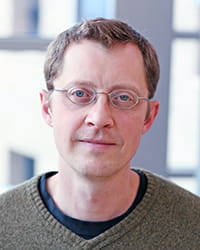Transformational Gift Boosts Research to Generate Human Organs
Transformational Gift Boosts Research to Generate Human Organs
Goal is to cure disease and end the need for transplants
Wednesday, April 04, 2018
Scientists at Cincinnati Children’s have received an instrumental investment in their work to personalize medicine through organoid technology. This cutting-edge approach uses a person’s own stem cells to create new tissues, allowing doctors to find answers about a child’s specific disease and how to treat it.
The Farmer Family Foundation has pledged $5 million to advance this pioneering research, which is being conducted at Cincinnati Children’s Center for Stem Cell and Organoid Medicine (CuSTOM).
“Organoid technology gives researchers a first-in-class platform for laboratory research on living diseased tissue, which cannot be done on patients,” says Aaron Zorn, PhD, the organoid center’s director. “It can provide human modeling systems in a petri dish for developing and testing drugs before expensive clinical trials."
The center’s goal is to use healthy, genetically matched tissues for regenerative medicine and eventually transplant. This organ-generation technology has the potential to address a shortage of organs available for transplantation.
The Farmer Family Foundation helped launch the organoid center last year with a pilot grant to Michael Helmrath, MD, the Clinical Translation Director of CuSTOM. This latest $5 million commitment to the research is a challenge grant, and the medical center has five years to match the gift with investments from other donors.
“The organoid work being done at Cincinnati Children’s is unlike anything we’ve seen anywhere in the nation. It has the potential to completely transform care for children needing organ transplants,” says Amy Joseph, Trustee, Farmer Family Foundation. “We want to encourage others to get involved in speeding up this discovery–that’s why we made our gift a challenge grant. Working together, we can benefit kids sooner.”
Seven years ago, Cincinnati Children’s scientists first used pluripotent stem cells to mimic natural human development and grow working human intestines in a lab. Today medical center doctors can bioengineer the small intestine, colon, stomach and mini livers. Cincinnati Children’s scientists are also working to bioengineer human esophageal, kidney and lung tissues to study human development and disease.
“The lab-engineered tissues can reveal the precise genetic and biological processes that cause disease,” says Helmrath. “Mini organs can identify the unique biological characteristics of a disease in a single person. This is truly personalized medicine.”
Margaret Hostetter, MD, chair of the Research Foundation at Cincinnati Children’s, believes the medical center is at a pivotal point in the innovation. “With the convergence of transformative breakthroughs in our organ-generation technology and generous supporters, like the Farmer Foundation, we are poised to speed up the translation cycle so children can benefit more quickly.”
Contribution Information
To make a contribution to this work, please follow this link.
For more information about contributions, please contact:
James Saporito
513-636-2509
james.saporito@cchmc.org
Contact Information
Nick Miller
513-803-6035
nicholas.miller@cchmc.org




